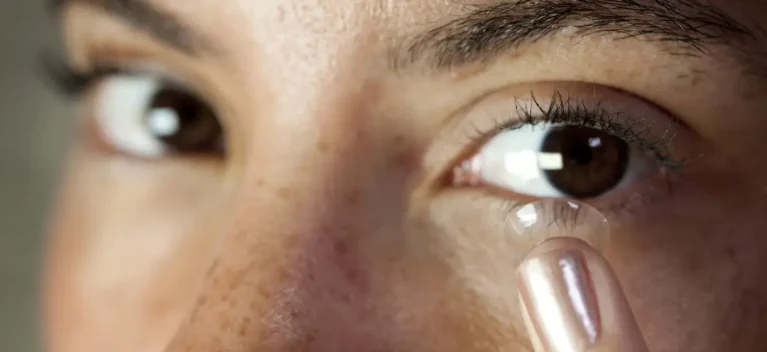Have you ever had trouble seeing at night and wondered, “Is this normal?” If finding your way in the dark feels like a big challenge, you might want to learn about night blindness. This blog is going to talk about it. We’ll tell you what night blindness is, how you can tell if you have it, why some people get it, and what you can do to help yourself see better when it’s dark.
Keep reading to find out how you can improve your night vision and feel more confident after the sun goes down.
Contents
What Is Night Blindness?
Night blindness, or what doctors call nyctalopia, is when someone has a hard time seeing in places that aren’t very bright or when it’s dark outside. This doesn’t just mean you need to squint a bit more to read a menu in a dimly lit restaurant—that happens to a lot of us. Night blindness is more serious. It’s like the lights are turned down low, making it tough to see the road while driving at night or to navigate your way through a dark room.
So, how is this different from just not seeing well in the dark? Well, everyone’s eyes take a moment to adjust from bright light to a darker environment. But if your eyes really struggle to make out details or if you feel blind in situations where others can see, it might be night blindness.
Recognizing the Symptoms of Night Blindness
 If you’re wondering whether you or someone close to you might have night blindness, there are a few key signs to look out for. Knowing these symptoms can help you figure out if it’s time to see a doctor for a closer look. Here are the main ones:
If you’re wondering whether you or someone close to you might have night blindness, there are a few key signs to look out for. Knowing these symptoms can help you figure out if it’s time to see a doctor for a closer look. Here are the main ones:
- difficulty seeing in places where there’s not much light. This could be inside a dimly lit restaurant, at a movie theater, or during dusk and dawn.
- your eyes take a long time to adjust after moving from a brightly lit area to a darker one
- seeing poorly at night, especially while driving
- because seeing in low light can be challenging, there might be a higher chance of tripping, bumping into things, or falling when it’s dark.
- You might find yourself avoiding going out or driving at night because of the difficulty seeing.
If you notice these symptoms in yourself or someone else, it doesn’t automatically mean you have night blindness, but it’s a good reason to check in with an eye doctor. Remember, spotting these signs early and getting the right advice can make a big difference in handling night blindness effectively.
What Causes Night Blindness?
Night blindness can happen for a few different reasons, and understanding these can help you get to the bottom of why seeing in the dark might be tough. Here are some of the common causes:
- Vitamin A Deficiency: This vitamin is crucial for keeping your eyes healthy, and not getting enough of it can lead to night blindness.
- Retinitis Pigmentosa: This is a genetic condition where the retina gets damaged over time.
- Cataracts: Cataracts make the lens of your eye cloudy, which can make everything look blurry and make it harder to see in less light.
- Glaucoma: The treatments for glaucoma, like certain eye drops and surgeries, can cause side effects that include difficulty seeing in low light.
- Diabetes: People with diabetes can have changes in their eyes that affect night vision.
- Myopia: Also known as nearsightedness, this can make distant objects look blurry, and it can be worse in dim light or at night.
- Aging: As we get older, our eyes naturally change, and for some people, seeing in low light can get harder.
Knowing what’s behind your night blindness is the first step in dealing with it. Whether it’s something that can be fixed, like a vitamin deficiency, or something that needs careful management, like diabetes, understanding the cause can help you and your doctor find the best way to improve your night vision.
Diagnosis
Effective Treatments for Night Blindness

Treating night blindness depends a lot on what’s causing it in the first place. Once your doctor figures out why you’re having trouble seeing in the dark, they can suggest the best way to help you see better. Here are some treatments that might be recommended:
Vitamin A Supplementation
If your night blindness is due to a lack of vitamin A, your doctor might suggest changing your diet to include more vitamin A-rich foods like carrots, sweet potatoes, and leafy greens. In some cases, they might also recommend vitamin A supplements.
Corrective Lenses
For people whose night vision issues are part of being nearsighted, glasses or contact lenses can make a big difference. Sometimes, special lenses that reduce glare can help when driving at night.
Surgery for Eye Conditions
If cataracts are the reason for your night blindness, surgery to remove the cloudy lens and replace it with an artificial one can restore your night vision. Other eye conditions that lead to night blindness might also be treated with surgery, depending on your specific situation.
Read More: Best Hospitals For Cataract Surgery
Managing Chronic Conditions
If diabetes or another health condition is affecting your night vision, working closely with your doctor to manage it can help improve your symptoms. This might include medication, diet changes, or other treatments.
Safety Measures
While this isn’t a treatment for the cause of night blindness, taking certain safety measures can help you navigate the world more safely at night. This includes using brighter lights at home, being extra cautious when driving in the dark, and perhaps using assistive devices like a cane if needed.
Low Vision Aids
For some people, low vision aids like magnifiers or adaptive technology can make it easier to read and do other tasks in low light.
Remember, the best treatment for you depends on what’s causing your night blindness. Talking to an eye care professional about your symptoms and getting a proper diagnosis is the key to finding a treatment that can help you see better when the lights go down.
Conclusion
Suffering from eye diseases? Don’t wait for your symptoms to get worse. Your vision is precious, and taking early action is key to preserving it. At Best Eye Hospital in India, we’re committed to providing top-notch care for your eyes. Whether you’re concerned about night blindness or any other eye condition, we’re here to help. Book your free appointment now or give us a call at +91 9711116605. Let’s work together to keep your eyes healthy and your vision clear.


 While not all causes of night blindness can be prevented, especially those due to genetic conditions, there are steps you can take to reduce your risk and keep your eyes as healthy as possible. Here’s how:
While not all causes of night blindness can be prevented, especially those due to genetic conditions, there are steps you can take to reduce your risk and keep your eyes as healthy as possible. Here’s how:
